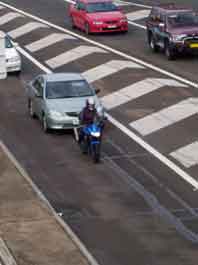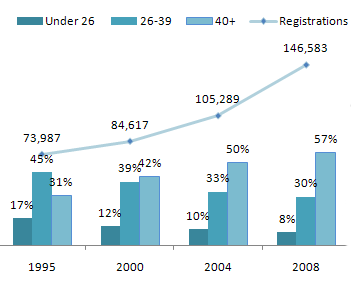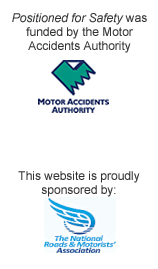Safer People

The key issues identified include:
- The behaviour of both riders and drivers who lack consideration for their own safety or that of other road users.
- The lack of courtesy and tolerance between road users.
- Riders need to better understand and manage road hazard risks.
- The issue of unlicensed and reckless riding.
- The need to continuously monitor and improve pre and post license rider training.
- The need for more effective distribution of safety information to riders.
The MCC objective for Safer People is to:
1. Promote low-risk attitudes to riding.
2. Reduce the incidence and severity of multi-vehicle crashes involving motorcyclists.
Motorcycle safety
Australia is a world leader in road safety except in the area of motorcycle safety. In 2001 we were ranked 9th best out of 27 OECD nations for road safety based on the number of fatalities per registered vehicle, except in relation to motorcycles.
At the same time we were ranked 18th for motorcycle safety having recorded 6.2 fatalities per 10,000 registered motorcycles compared to the OECD average of 3.6. (ATSB, 2004)
The aim of this site is to give motorcyclists up to date information about road safety and what you can do to keep yourself safe. This section provides the latest statistics on motorcycle crashes in NSW and is based on data provided by courtesy of the RTA (2009). It includes all serious road crashes reported to Police for the period 2004-2008.
The number of motorcycle crashes reported in NSW has risen by 17% over the past five years, but this has to be understood in the context of the number of registered bikes which has increased by 39%. The crash rate is lower, with 180.9 crashes for every 10,000 registered motorcycles compared to 215.9 in 2004.
Riding is not becoming more dangerous, there are just a lot more riders out there. More needs to be done to make riding safer, by road authorities, other road users and riders.
Motorcycle crashes represent only 5% of all road crashes, but they account for 14% of all fatal crashes and 9% of all injury crashes. Riders can best protect themselves if they understand and manage their risks. See Motorcycle crashes in NSW for more information.
Riders in NSW
The number of motorcycles on the road in NSW has increased from over 105,289 in 2004 to 146,583 in 2008.
The average age of motorcyclists in NSW has also increased and was 43 years in 2008.
Older riders (40 years +) now comprise 57% of registered owners in NSW. This is in sharp contrast to the number of young riders (Under 26), who represent only 8% of registered owners of motorcycles. The graph below illustrates the changing trend in registrations.

-
Motorcycle Crash Data 2006-2010
Approximately two and half thousand motorcycle crashes are reported each year in NSW. They represent 6% of all road crashes, but account for 15% of all deaths and 10% of all injuries on NSW roads....
-
Risk Factors
Road user behaviour is generally considered to be the most significant contributor to any road crash. Speed, alcohol and fatigue together with use of seatbelts and helmets are the main focus of most...
-
Other Drivers
Almost two out of three (61%) multi-vehicle crashes involving a motorcycle, the other driver was responsible. In motorcycle intersection collisions, the other driver is responsible in 71% of crashes. ...
-
Unlicensed Riders
Over the past five years (2006-2010), 904 unlicensed riders were involved in road crashes in NSW. This group includes those riders whose licence has been cancelled or disqualified as well as those...
-
Pillions
Pillion passengers represent only about 6% of motorcycle casualties, but their injuries are likely to be severe. Compared to licensed riders, unlicensed riders are twice as likely to be carrying a...
-
Rider Training in NSW
Learner training The NSW rider Graduated Licensing Scheme (GLS) involves two compulsory rider training courses (see chart on right). The first, a 2 day learn-to-ride course must be completed to...
-
MCC Strategies
1.1 There is a need to address the behaviour of those motorcyclists who ride without consideration for their own safety or that of other road users. 1.1.1 MCC to promote concepts of mastery of...

